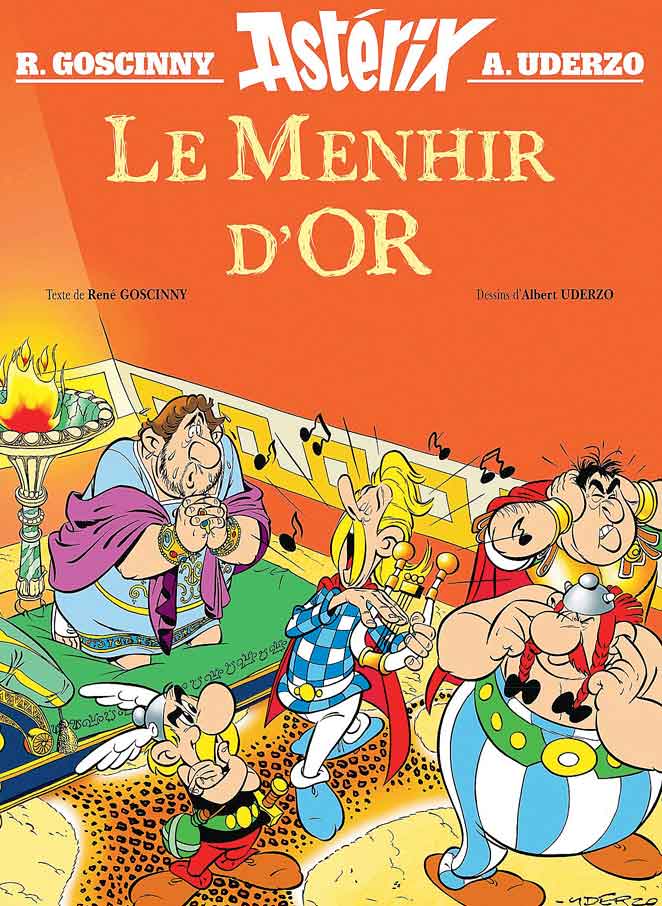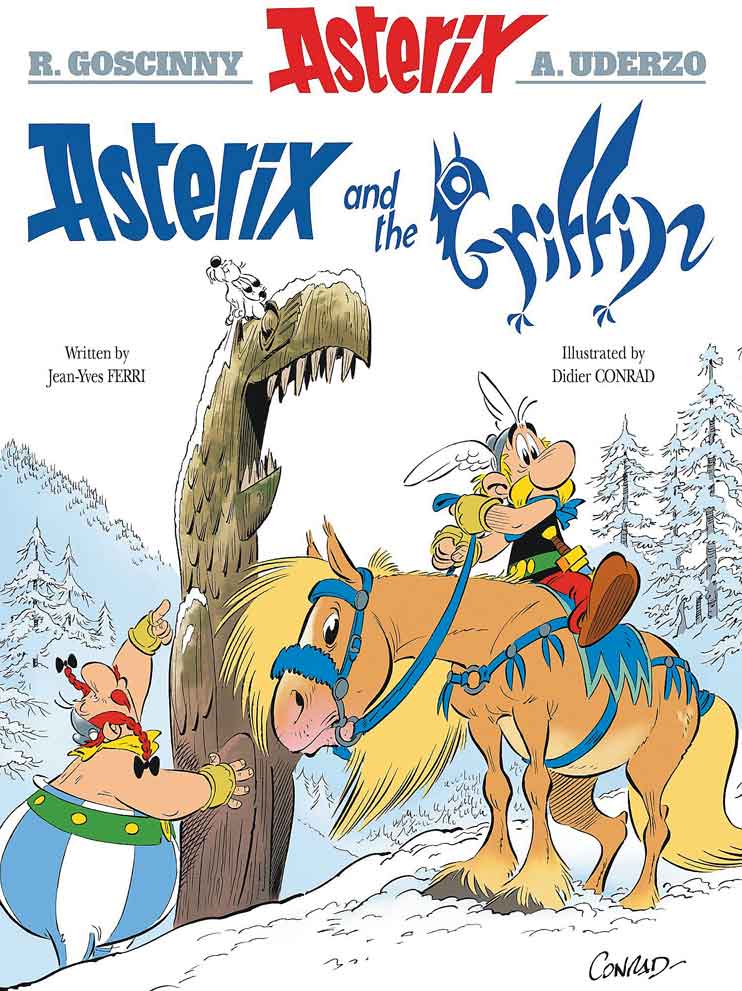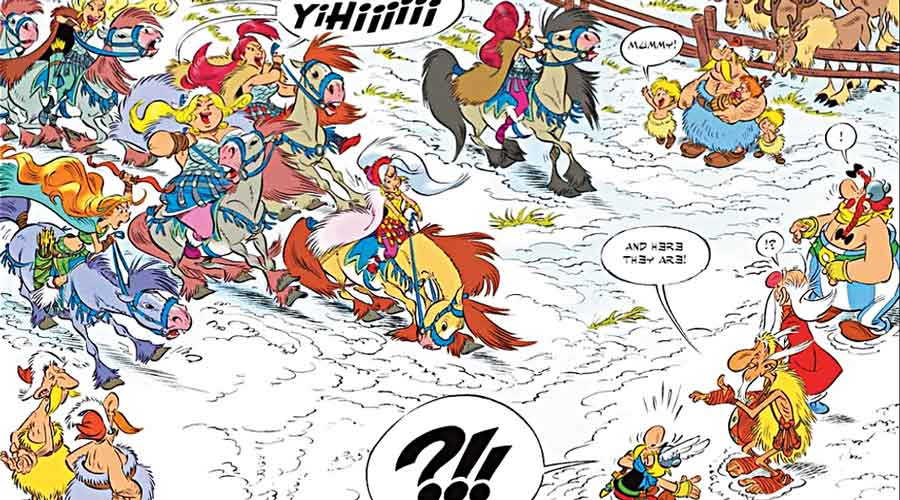Using humour based on anachronism with aspects of modern life residing in ancient settings, Asterix, Obelix, Dogmatix and a bunch of merry characters of a tiny village we have known so well since the 1960s have been winning generations of readers without bloodshed but with dollops of humour. Yet, the adventures of this boar-loving bunch have remained true to the initial idea — a small and besieged group fighting for freedom, even in the hands of Jean-Yves Ferri and Didier Conrad, who took over from Albert Uderzo in 2013, and are now into their fifth album, Asterix and the Griffin, which was published on Friday, October 22.

Le Menhir d’Or, originally brought out as an audio-book in 1967, was turned into a comic last year
Into his 39th adventure, Asterix continues to symbolise the weak, ones who don’t have physical means but have been blessed with intelligence to get out of tricky situations and save his world — a small village of indomitable Gauls holding out against the invaders, making life far from easy for the Roman legionaries who garrison the fortified camps of Totorum, Aquarium, Laudanum and Compendium.
In the story, the year continues to be 50BC but the ink running through the veins of the new adventure is a reflection of our times. In Roman eyes, the world to the east of Rome looks like “Barbaricum” as beyond the furthest outposts is a land of “barbarians, strange peoples with unpronounceable names” but the “unknown world is all the more terrifying because the Romans have always said it’s home to all sorts of outlandish creatures — Chimera, Harpy, Sphinx, Hydra and that one animal which remains especially enigmatic, the Griffin, a half-eagle and half-lion with horse’s ears. “A true king among beasts” announces Cartographus before Julius Caesar. And the mighty one must have the Griffin.

Asterix and the Griffin. In the new album, Fanciakuppov, the wise old Shaman, declares: “Sarmatian women are nomadic warriors while we men stay peacefully in the village”
To protect the village druid Getafix and a barrel of magic potion (which finds itself in a tricky situation!), Asterix, Obelix and Dogmatix arrive in the lives of the nomadic people — the Sarmatians, living in a region stretching from what appears to be present-day Ukraine to the foothills of the Caucasus and the steppes of Central Asia.
It’s not the easiest of albums to ink because the setting is snow-covered, so there is a predominance of white, yet Ferri and Conrad come away winning over readers because of a tight script, complete with names that have a Russian, Kazakh or Mongolian feel to it. The action moves as fast as the warriors in the new setting — the women of the village. Fanciakuppov, the wise old Shaman, declares: “Sarmatian women are nomadic warriors while we men stay peacefully in the village.” Fanciakuppov’s niece, Kalashnikova, has been captured by the Romans as a bargaining chip for the Griffin, and her catchphrase — ‘meh’ — is reflective of the feeling of stress and uncertainty surrounding teenagers during the pandemic.

Rene Goscinny and Albert Uderzo, the creators of Asterix. The daughter of Rene Goscinny has confirmed the presence of fragmentary drafts for Asterix in the Circus. Anne has said it would be a “wonderful adventure” for it to be restored and published
The other element running through the book is global warming and the climate crisis in general, which can’t be discussed in details without throwing spoilers at you. In a way, it captures what Prince William recently said about saving our planet: “We need some of the world’s greatest brains and minds fixed on trying to repair this planet, not trying to find the next place to go and live.”
Asterix and the Griffin has appeared at a very interesting time. The daughter of Rene Goscinny, who died of a heart attack in 1977 at the age of 51, has confirmed the presence of fragmentary drafts for Asterix in the Circus. It’s a half-finished original Asterix story which could have been the album following Asterix in Belgium. Anne has said it would be a “wonderful adventure” for it to be restored and published.
The news appears close on the heels of Le Menhir d’Or (The Golden Menhir), originally brought out as an audio-book in 1967 that was turned into a comic last year. Though we still don’t have an English language translation yet, the recent volume includes drawings by Albert Uderzo, who died in March last year at the age of 92. The audio-book released on LP had fallen into oblivion despite the comic’s global popularity and what makes the book special is that Uderzo had worked on the project before his death and had “supervised the restoration of his original drawings by his most faithful employees. He gave his opinion and worked on the cover”. The plot hinges on Cacofonix, the delightful (to the readers!) bard in Asterix’s village, whose singing is widely deemed to be awful.
Cacofonix is convinced that he has a fine voice and decides to take part in a singing competition, which he attends accompanied by Asterix and Obelix.
The characters with their bulbous noses appear as pleasing today as it did decades ago. Like the French, the Gallic villagers spend most of their time eating and quarrelling (or at least disagreeing). And like many communities around the world, when threatened, they unite — after slurping the contents of several vats of magic potion — to defeat the enemy.











